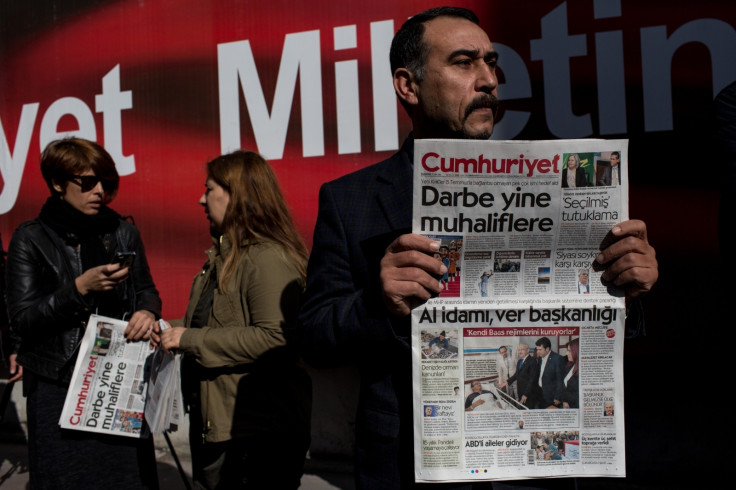Turkey Press Freedom Day: The state of media in the country with the most imprisoned journalists
17 journalists of Cumhuriyet, Turkey's oldest newspaper, are going to face terrorism trial on 24 July.
Turkey is set to begin the trial of 17 journalists accused of aiding terrorist organisations. And, if found guilty, they could face up to 43 years in jail. The government says that the reporters and executives from Cumhuriyet, the oldest upmarket Turkish daily newspaper, supported the separatist Kurdistan Workers Party (PKK) and the Fethullah Gulen, who is accused of masterminding the coup attempt of July 15, 2016.
The charges against the journalists also alleged that they have changed "the paper's editorial policy", prepared "violent and divisive news" and interviewed "leaders of terrorist organisations". But, the defence lawyer Adil Demirci has dismissed the charges, saying: "This is an oddity, it is absurd. This is obviously a political case. They are targeting Cumhuriyet because it is an opposition paper."
The trial of the media persons is expected to start on Monday, 24 July – the day used to be celebrated by Turkish journalists as the anniversary of the abolishment of official press censorship in the country. Though Press Freedom Day has not been celebrated for years in the country, it is marked by journalistic associations.
The first time appearance of the Cumhuriyet's members in the court on the 267th day of their arrests shows the sorry state of press freedom in the country.
"I cannot touch him. I cannot hug him. We talk over the phone behind a glass. When the time is up, they cut the line. It is so frustrating to be taken away from him every week," Elif Gunay, daughter of journalist Turhan Gunay, told the BBC.
"All I can say is that this is a political case. They are held for being journalists, for doing their jobs," she added.
Is the state of press freedom in Turkey at its worst?
The development came days after Turkey marked the first anniversary of the failed military coup. President Recep Tayyip Erdogan delivered an emotional public speech on 15 July, praising those who joined in the protests, including the country's parliamentarians as "defenders of democracy and his government".
He hailed the day as the triumph of democracy.
But the critics have argued that the day - and the introduction of the state of emergency soon after - were actually the foundation of a massive crackdown, with more than 50,000 people arrested last year, the BBC reported.
According to Press freedom groups, media was one of the most vulnerable ones to get hit during this period, with more than 150 journalists believed to be behind bars in Turkey, the highest in the world ahead of China and Egypt.
It was also reported that as of March 2017, 173 media outlets had been shut down, including newspapers, magazines, radio stations, websites and news agencies that resulted in the laying off of more than 2,500 journalists in Ankara, the Guardian reported.
But the government has contradicted that number.
President Erdogan has said earlier in this month that there were only two jailed journalists in the country.
"The rest are either terrorists, or they were carrying guns, or they robbed ATM machines," he said.
Can Dundar, the previous editor-in-chief of Cumhuriyet newspaper and the number one suspect in the case starting on Monday, told the BBC on Skype that he wonders "who those two journalists Mr Erdogan speaks about are".
Dundar was given a three-month jail term in 2016 for spying in another case but was released on bail. He now lives in exile in Germany.
"Mr Erdogan hates criticism. He regards every criticism as an insult to himself or as a terrorist act. We know that all those people are journalists and they've done nothing but journalism," he added.
Outcry from all across the world
The arrest of journalists has garnered criticism from all around the world with the UN human rights council's working group on arbitrary detentions issuing a legal opinion arguing that the arrest of the Cumhuriyet staff was a violation of human rights and was "arbitrary".
It is said that journalists and press freedom activists all over the world will be watching the Cumhuriyet trial very closely. The trial is expected to continue until 28 July.

The International and European Federation of Journalists (IFJ/EFJ) has also backed the Cumhuriyet.
IFJ President Philippe Leruth said: "The EFJ and IFJ see these charges for what they are, blatant persecution of an independent and critical newspaper and its employees.
"We demand the immediate release of the Cumhuriyet employees as well as all other journalists jailed for exercising their right to free expression."
© Copyright IBTimes 2025. All rights reserved.





















